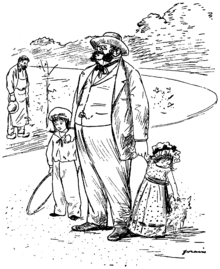parvenu
A parvenu (from French: parvenir “to get to something”) or an upstart is a person who has become wealthy in the first generation (or has risen to a higher social class / status ) person who is assumed to be unable to adhere to etiquette and To adapt the conventions of so-called better circles ( milieus of the middle or upper class ), of which it is claimed to be partly still attached to the manners of their milieu of origin and thus “no longer at home in need and in abundance”. Hannah Arendt used the term as a term for a Jew striving for advancement through assimilation in an anti-Jewish, non-totalitarian political environment.
To the subject
It is a derogatory expression with the connotation of the uncultivated and uneducated , which was used especially by the nobility for climbers at court . Correspondingly, the new rich (so-called “new money”) were later also disparagingly referred to as “parvenus” by the traditionally wealthy (so-called “old money”).
While the terms “ social advancement ” and “climber” tend to be objective-neutral (or even positive) terms, “parvenu” and “new rich” are derogatory terms.
The terms, which are often used as insults or swear words, imply a discrepancy between an increase in economic capital and a non-increase in cultural capital . (The American myth “ from dishwasher to millionaire ”, for example, can also be understood as an ascent in the social hierarchy based solely on economic success .) The reverse is usually the case with members of the bohemians who have cultural capital (education , Art concepts, art creation, etc.), but often hardly any economic capital.
The term “upstart” is a translation by Philipp von Zesen for the word parvenu . In the English-speaking world, nouveau riche is the opposite of old money . Similar terms have been known since Roman times, for example Homo novus (German: new man). In the late Habsburg Monarchy, the newly aristocratic proprietors were called the Second Society .
Hannah Arendt's parvenu concept
In a narrower sense, the term is used by the political theorist Hannah Arendt who, in her analysis of the history of Judaism in Europe, especially in her post-doctoral thesis Rahel Varnhagen. Life story of a German Jewish woman from the Romantic era , Jews striving for advancement and assimilation called parvenus , who, due to the predominantly anti-Jewish attitude of the surrounding societies, cannot achieve their goal of merging with the respective nationality and become entangled in a kind of self-deception. In a dichotomous manner , she coined the term pariah as a term for Jews who refuse to assimilate themselves. According to Arendt, the pair of terms pariah and parvenu can also generally refer to people who assume an outsider position in a society or who attempt to overcome this unsuccessfully.
See also
literature
- Jost Hermand : The Wilhelminian Parvenu. in: Aspects of the early days . Catalog for the exhibition at the Akademie der Künste (Berlin) from September 8 to November 24, 1974, pp. 7–15.
- Hannah Arendt: Rahel Varnhagen. Life story of a German Jewess from the Romantic period. Piper, Munich / Zurich 1959/1997, ISBN 3-492-20230-6 .
Web links
Individual evidence
- ↑ Konrad Adam: He can do it! The party of the higher earners. In: Frankfurter Allgemeine Zeitung, June 12, 2007, p. 37
